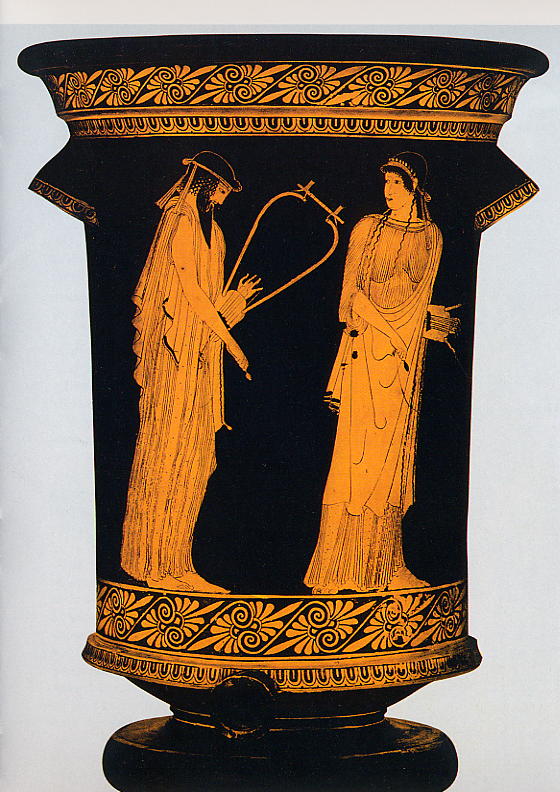Sappho 1 D. H. Comp. 23 (vi 114ss. Usener-Radermacher) (+P. Oxy.)
Translated by Steven J. Willett

This is a red-figure kalathos vase of Sappho holding a lyre and plectrum as she listens to Alcaeus sing c. 470BC. We have no sculptures or depictions of Sappho with any reliability. She lived c.630~c.570BC in Mytilene, Lesbos.
Note: Dionysus of Halicarnassus writes the following about Sappho in his On Literary Composition: “I will give examples of this style– polished and exuberant composition–among poets selecting Sappho, among orators Isocrates. I shall begin with the lyric poet.”
High-wrought enthroned, everlasting, Aphrodite,
child of Zeus, wile weaverer, I entreat you:
don’t with ache and anguish attempt to break my
heart, O my goddess,
come here now if ever you tended to act
when perceiving cries of my voice far off you
heard me, leaving then from your father’s golden
home you descended
yoked to chariot; the alluring fine swift
sparrows brought you over the gloomy earth their
countless wings awhirl from the heavens down to
middle air regions,
quickly they arrived; and then you, my blessed,
smiling on me out of your deathless visage
asked what troubled me now this time and why
I had again called,
what I most desired to befall me with my
maddening heartache: “Whom to persuade this time
must I lead you back to her love? For who, O
Sappho, has hurt you?
If she flees away, she will soon pursue you;
if she has no welcome for gifts, she’ll give them;
if she does not love, soon she’ll fall in love
even unwilling.”
Come to me anew and deliver bitter
inescapling cares from me now, but render
all my heart desires me to render, and you
stand as my comrade.

…………smiling on me out of your deathless visage……….
Pow, what a way to stress the immortality of the gods; while we mere mortals daily strut and fret our own mortality. We beseech the gods for advice, when they can never know what choices we must face on our own mortal coil?
So Aphrodite’s chariot was pulled through the sky by thousands and thousands of sparrows!!!?
Doesn’t that mean you can see her coming then? Like that little cloud on the horizon, far, far away— that cloud no bigger than a man’s hand?
And somehow you don’t even realize what is happening, until….
Monsoon? 🙂
Those formations of birds, sparrows. It seems millions of them going through their incredible acrobatics, whirling this way, and then that, with preternatural, elegant coordination….
Doesn’t that mean they are going somewhere?
To see someone?
I never thought about it like that.
I always have somehow associated Sappho with Colette, particularly with the Provence book, ‘Break of Day’.
In which, an older and wiser–but still oh, so dangerous– Colette says intriguing things like: “I remember very definitely that when I was wretched because I had been disappointed in love, my animals loved me less. They scented my grief, that great admission of failure. I have seen an unforgettable look in the eyes of a beautiful well-bred bitch, a look still generous but restrained and politely bored…”
So , sideways thinking, as usual: Colette…Oh yes. Sappho!
Who is this Sappho, anyway?
A few days later a slim little book arrived in the mail, from Amazon. (Though now I have learned about Thrift Books.) I opened it, remembering then that I had decided to find out for myself.
I fixed a strong cup of coffee. I want to be alert, now more than ever, when I am reading. Or looking. In Europe, I am a sturdy double espresso turista.
To be wired is good in the Prado.
I thought: “OK, Bitch, show me!”
First thing I see: ‘You may forget but let me tell you this–Someone in some future time will think of us.”
Hmmm.
The second: “You set me on fire.”
She owns that then? Not St. John of the Cross?
The third: “Eros–giver of pain.”
Girl is pre-Freudian! (But aren’t they all that way, anyway?)
I begin the process of translating. From the English. Otherwise known as stealing.
(Thank you someone named Barnard, for the jump start.) (And, of course, thank you, Mr. Steven J. Willett. You’ve got me staggering along. Do the Japanese have a word for ‘ tough course?’ )
No Word
I haven’t heard a word
from her.
When she left, she cried a lot.
She said to me, ‘ I can’t bear to part from you, Sappho. I go unwillingly.’
I said, ‘Go, and be happy. But–you know what we shared–
Remember those you are leaving behind,
those who have taken you into their hearts.
If you begin to forget me, think
of our gifts to Aphrodite,
and how lovely it was what we had together.
All the tiaras of violets,
and the braided rosebuds, dill, and crocus
twined around your young neck.
Myrrh sprinkled on your head,
and girls on soft mats
with all they needed or wanted beside them.
How we never missed dances and choruses,
Were always singing through the budding woods in spring—‘
Frankly, I wish I was dead.
————————————————————————————————-
Ah, Sappho, the greatest lyric poet of Greece, the greatest female poet ever – one can only hope that one day her we’ll meet her equal. Of the countless lost Greek and Latin books, the loss of something like 95% of her poems is still, for me, the biggest and most painful. For 25 years have I hoped beyond any reason that, somwehere, there’s a forgotten manuscript or palimpsest with a lot more of her works, and that one day it will be discovered, and I’m probably be going to die with that hope still alive.